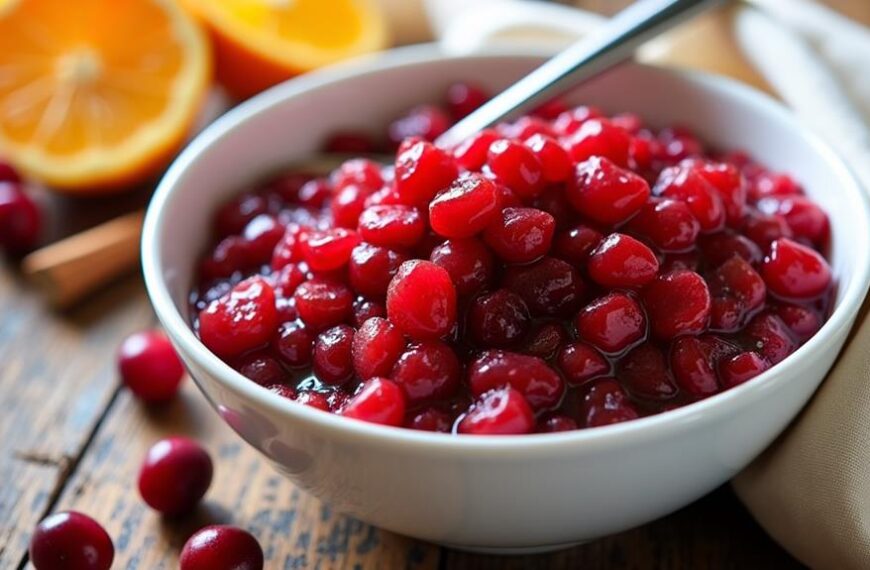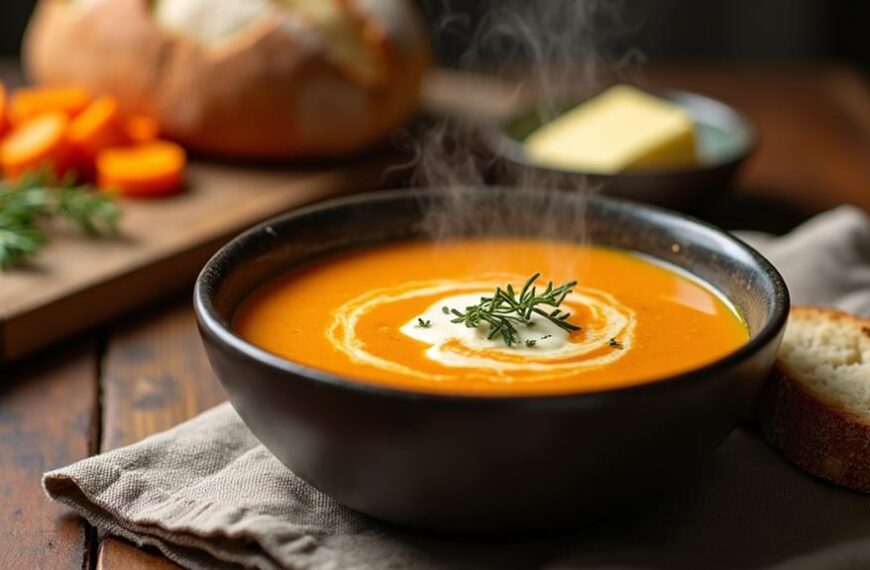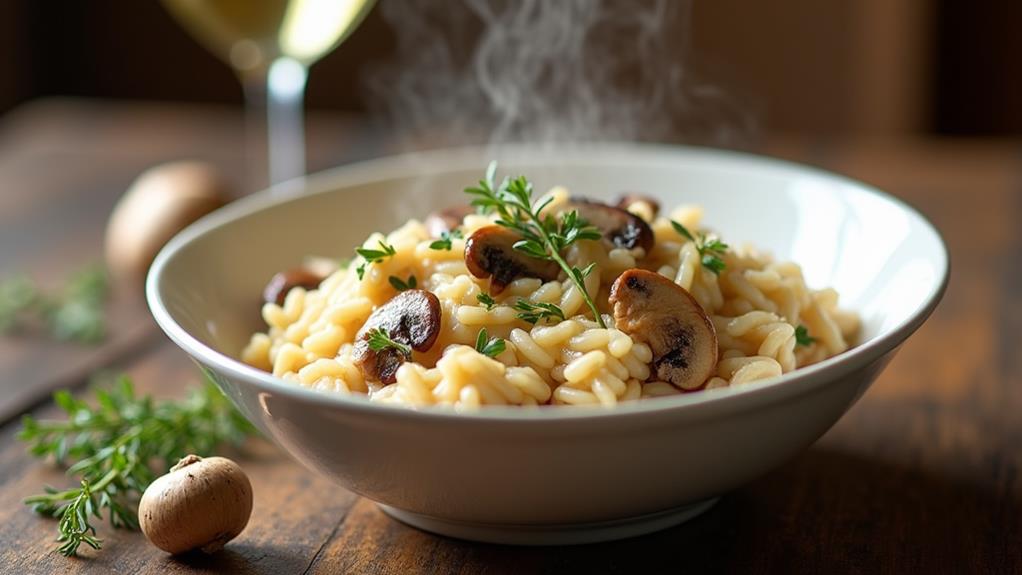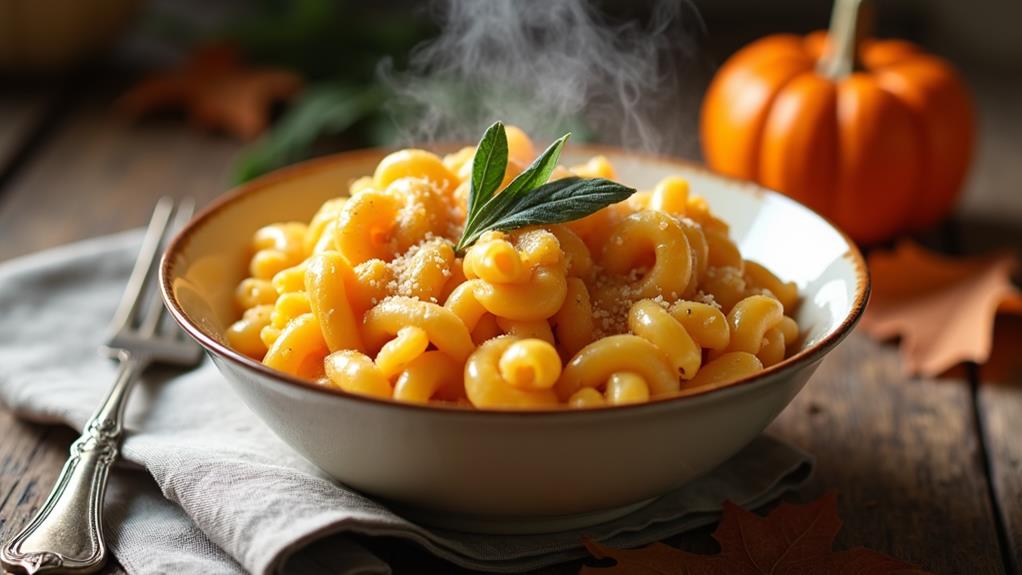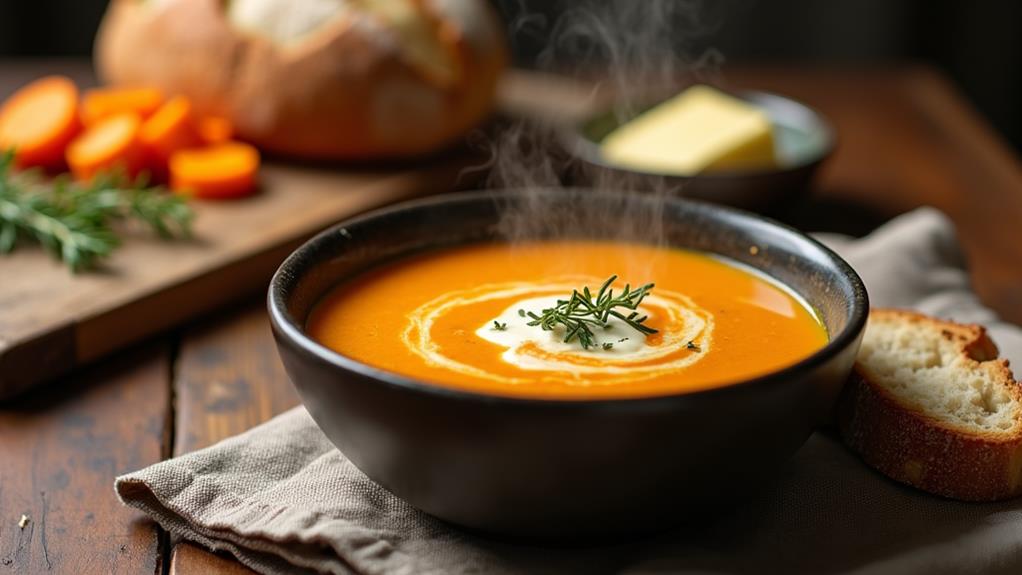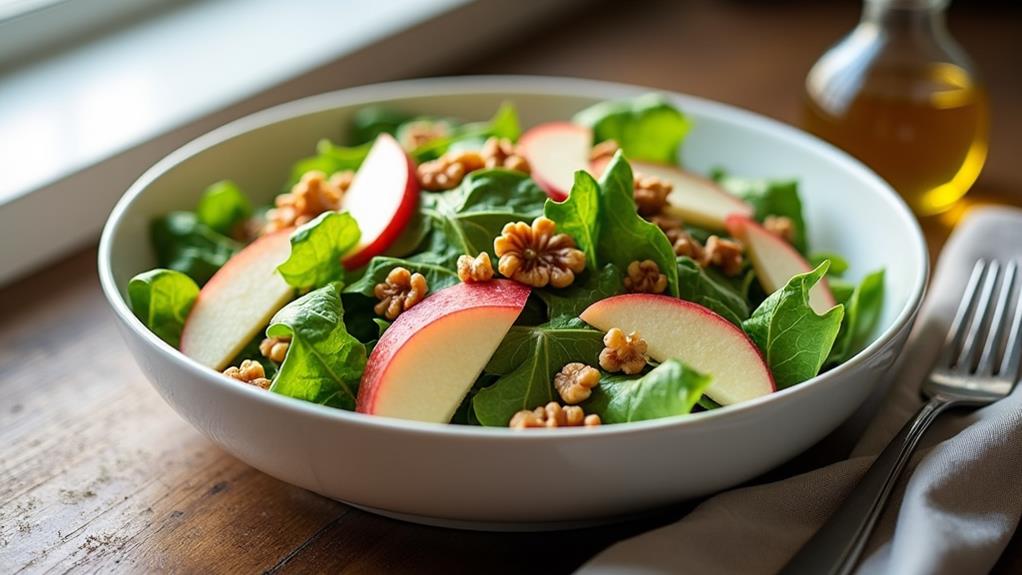To unlock the flavor secrets of culinary maestros with herb-charged marinades, you'll need to master the art of herb selection and preparation. Choose a balanced blend of classic and unique herbs, considering their potency and pairing potential. Properly wash and chop your herbs, then combine them with oils, acids, and aromatics to create a flavorful base. Adjust marinating times based on the herb's robustness and the protein's tenderness, always prioritizing food safety. Experiment with different herb combinations, oils, and sweet elements to enhance various dishes beyond meats. By avoiding common mistakes and understanding temperature's role, you'll elevate your culinary creations to new heights.
Selecting the Perfect Herb Ensemble
Choosing the right herbs is crucial for creating a flavorful marinade. When selecting your herb ensemble, consider the diverse flavor profiles offered by various herb varieties. Start by exploring classic options like rosemary, thyme, and oregano, which provide robust, earthy notes.
For a brighter, citrusy touch, incorporate lemon verbena or lemongrass. Don't shy away from experimenting with less common herbs like tarragon or lovage to add unique dimensions to your marinade.
As you craft your herb blend, think about the balance of flavors. Pair strong, assertive herbs with milder ones to create a harmonious profile. For instance, combine pungent sage with delicate chives.
Consider the cuisine you're aiming for and select herbs that align with those flavor traditions. Mediterranean-inspired marinades might feature basil and marjoram, while Asian-influenced blends could include Thai basil and cilantro.
Remember to adjust quantities based on the potency of each herb. Fresh herbs generally require larger amounts than their dried counterparts. By thoughtfully selecting and combining herbs, you'll create a marinade that elevates your dishes and showcases your culinary innovation.
Mastering Herb Preparation Techniques
With your herbs selected, it's time to focus on preparing them for your marinade. Mastering herb preparation techniques is crucial for unlocking maximum flavor and ensuring optimal herb preservation.
Start by washing your herbs thoroughly and patting them dry with a clean towel. Next, consider the best method for incorporating each herb into your marinade based on its unique characteristics.
For leafy herbs like basil, parsley, and cilantro, you'll want to:
- Remove the leaves from the stems
- Stack the leaves neatly
- Roll them tightly into a cigar shape
- Slice thinly across the roll to create fine ribbons
This chiffonade technique allows for even distribution of flavor throughout your marinade.
For woody herbs like rosemary and thyme, strip the leaves from the stems and finely chop them.
Don't forget to consider seasonal herb selection when planning your marinades, as fresh, in-season herbs will provide the most vibrant flavors.
Balancing Herbs in Marinade Ratios
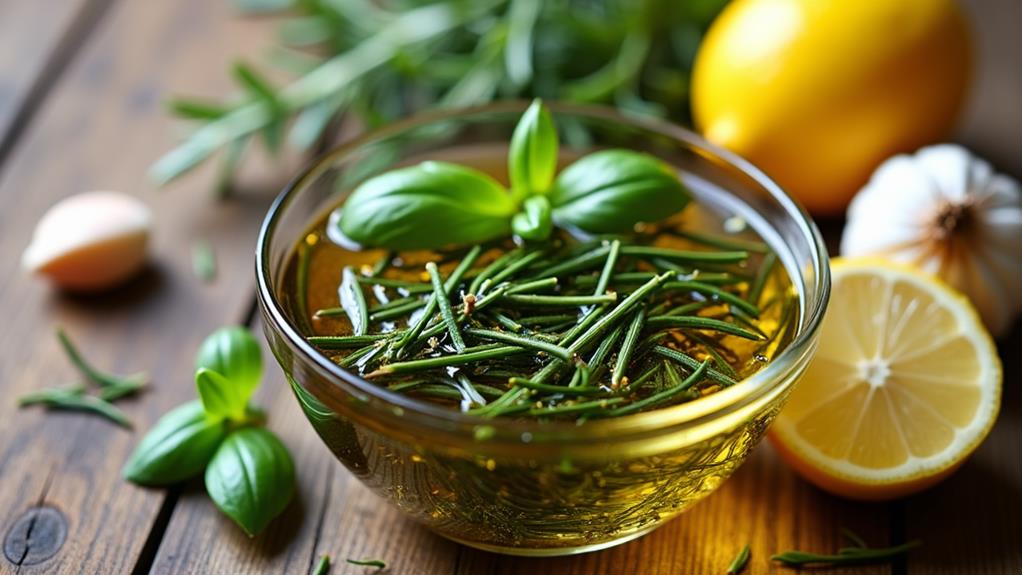
The art of balancing herbs in marinade ratios is crucial for creating harmonious and flavorful dishes. When crafting your marinade, you'll need to consider the herb intensity and how it interacts with other ingredients.
Start by selecting a primary herb that complements your main protein or vegetable. Then, add secondary herbs to build complexity without overpowering the primary flavor profile.
To achieve balance, use a 3:1:1 ratio of primary to secondary herbs. For example, if you're using 3 tablespoons of rosemary as your primary herb, add 1 tablespoon each of thyme and oregano as secondary herbs. This ratio ensures that the flavors work together without clashing.
Remember, dried herbs are more potent than fresh ones, so adjust accordingly. If using dried herbs, reduce the amount by one-third.
Experiment with different combinations to discover unique flavor profiles. Don't be afraid to mix bold herbs like sage with milder ones like parsley.
As you refine your technique, you'll develop an intuitive sense of which herbs pair well together and in what proportions, elevating your marinades from good to extraordinary.
Optimal Marinating Time for Herbs
Determining the optimal marinating time for herbs is crucial to extract maximum flavor without overwhelming your dish. You'll want to strike a balance between infusing your ingredients with herbal essence and preserving their natural textures. The key lies in understanding the potency of your chosen herbs and the nature of the food you're marinating.
For most herbs, you'll find that:
- Tender herbs like basil and cilantro require shorter marinating times (30 minutes to 2 hours).
- Robust herbs such as rosemary and thyme can marinate longer (2 to 8 hours).
- Delicate proteins like fish benefit from brief marination (15 to 30 minutes).
- Tougher meats can withstand extended marinating (up to 24 hours).
When experimenting with marinating times, consider herb preservation methods to maintain freshness. Dried herbs often require longer marination to rehydrate and release their flavors.
Remember to follow marinating safety tips, such as refrigerating your marinades and discarding any leftover mixture that's come into contact with raw meat.
Temperature's Role in Herb Infusion
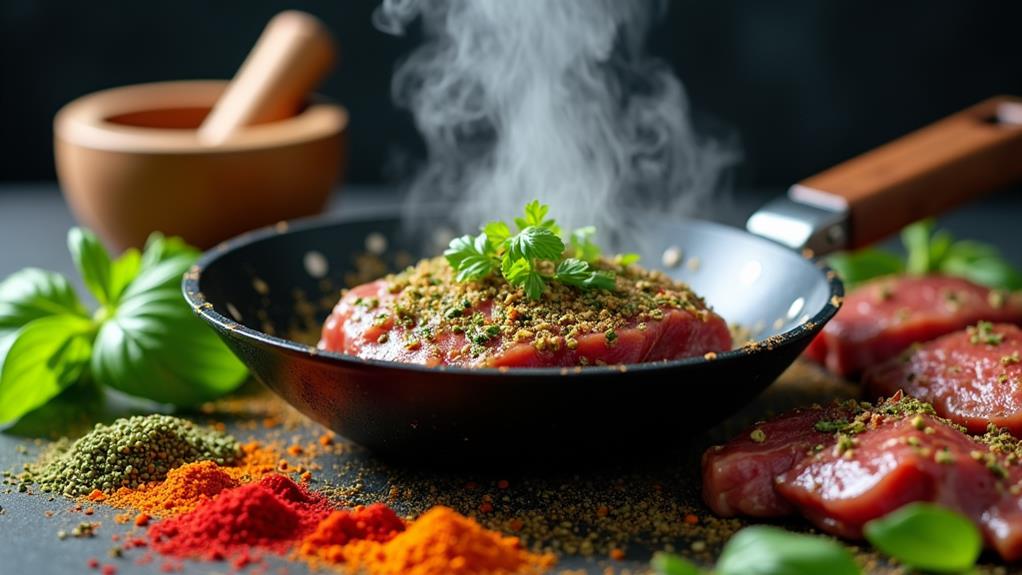
Temperature plays a crucial role in herb infusion, significantly impacting the rate and intensity of flavor extraction. When you're preparing an herb-charged marinade, understanding how temperature affects the process can elevate your culinary creations to new heights.
Warmer temperatures accelerate herb extraction, intensifying flavors more quickly. However, you'll need to strike a balance, as excessive heat can degrade delicate herb compounds.
For optimal results, consider using a two-step temperature approach. Begin with a brief high-temperature infusion to jumpstart the process, then reduce the heat for a longer, gentler extraction. This method allows you to capture both the volatile aromatics and the deeper, more complex flavors of your chosen herbs.
You can also experiment with temperature cycling, alternating between warm and cool periods to create a layered flavor profile.
Versatile Applications for Herbal Marinades
Now that you've mastered the art of temperature-controlled herb infusion, it's time to explore the wide array of dishes that can benefit from your herb-charged marinades. The versatility of these flavor-packed concoctions extends far beyond the typical meat applications, opening up a world of culinary possibilities.
For instance, just as spicy shrimp tacos with mango salsa offer a delightful mix of flavors, your herbal marinades can create equally exciting and harmonious combinations with various ingredients.
Your herbal marinades can transform a variety of ingredients, creating exciting flavor profiles through herb synergy. Consider these innovative applications:
- Grilled vegetables: Elevate roasted peppers, zucchini, or eggplant
- Tofu and tempeh: Infuse plant-based proteins with robust flavors
- Grain salads: Toss quinoa or farro with herb-marinated vegetables
- Seafood: Enhance delicate fish or shellfish with subtle herb blends
Don't limit yourself to traditional uses. Experiment with marinating fruits for desserts or cheese for appetizers.
The key is to match the intensity of your marinade to the ingredient's natural flavors. For robust items like portobello mushrooms, use bold herb combinations. With more delicate foods, opt for lighter, citrus-based marinades with tender herbs.
Crafting Custom Herb-Infused Blends
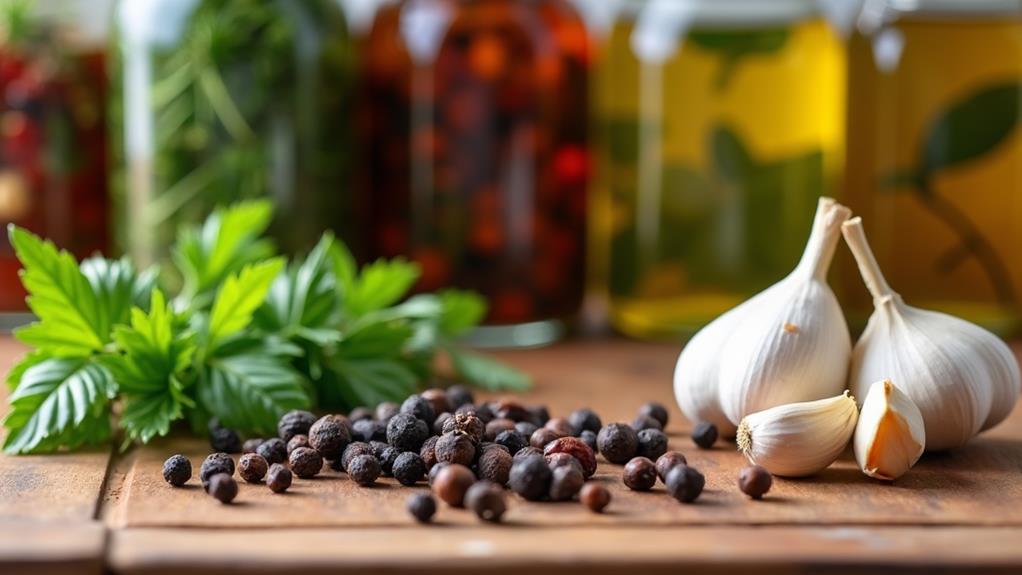
Creating your own custom herb-infused blends is where the real magic happens in herb-charged marinades. You'll unlock a world of flavor enhancement possibilities by combining different herb profiles to suit your culinary vision.
Start by selecting a base herb, such as rosemary or thyme, then layer complementary herbs to build complexity. Don't be afraid to experiment with unexpected combinations, like basil and mint or sage and tarragon.
Consider the dish you're preparing and choose herbs that will harmonize with its flavors. For Mediterranean-inspired meals, blend oregano, basil, and marjoram. If you're aiming for an Asian flair, try mixing cilantro, lemongrass, and Thai basil.
Remember to balance strong herbs with milder ones to avoid overpowering your marinade.
To craft your blend, finely chop fresh herbs or crumble dried ones. Mix them with oil, acid (like vinegar or citrus juice), and aromatics such as garlic or shallots.
Taste and adjust as you go, keeping in mind that flavors will intensify as the marinade sits. By mastering custom herb-infused blends, you'll elevate your marinades from ordinary to extraordinary, impressing even the most discerning palates.
Frequently Asked Questions
Can I Use Dried Herbs Instead of Fresh in Marinades?
You can definitely use dried herbs in marinades. They're more concentrated, so you'll need less. Experiment with ratios to achieve your desired flavor intensity. Try rehydrating dried herbs first for a unique twist on traditional marinades.
How Do I Prevent Herbs From Burning During High-Heat Cooking?
Picture your herbs as tiny firefighters, bravely battling the inferno. You'll save them by embracing innovative cooking techniques. Strategically select herbs, use oil shields, and time their entry. Don't let your culinary creation become a herb crematorium!
Are There Any Herbs That Should Never Be Used in Marinades?
You'll find most herbs work well in marinades, but be mindful of herb compatibility and flavor balance. Avoid using delicate herbs like basil or cilantro in long marinades. Instead, add them fresh just before cooking for optimal taste.
Can I Reuse Herb-Infused Marinades After They've Been Used Once?
You're about to reuse that marinade, but wait! Safety concerns arise from potential bacterial growth. Plus, flavor degradation's a real risk. Instead, why not innovate? Try repurposing leftover marinade as a sauce base after boiling it thoroughly.
How Long Can I Store Homemade Herb-Infused Marinades in the Refrigerator?
You'll maximize your homemade herb-infused marinade's shelf life by storing it in an airtight container. Refrigerate for up to 5 days, or freeze for 2-3 months. For optimal freshness, consider making smaller batches more frequently. Experiment with preservation techniques!
Final Thoughts
You've now unlocked the secrets of herb-charged marinades, transforming your kitchen into a flavor laboratory. With these techniques, you'll create explosions of taste that'll make your taste buds dance. Remember, the perfect balance of herbs, meticulous preparation, and precise timing are your tools for culinary greatness. As you experiment with custom blends and applications, you'll discover a world of flavors so vibrant, they'll practically leap off the plate. Your dishes will become legendary, leaving diners in awe of your herbal mastery.





